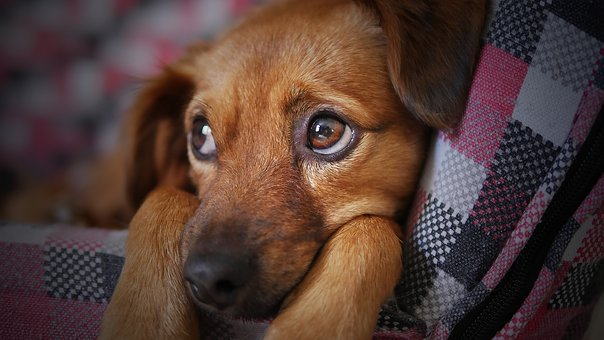Anyway, about the separation anxiety. I was gone into Raleigh for five or six hours one day and left Mason with my Mother. When I got back she told me that he ran from his favorite window where he can see everything to the door I would come through when I returned, over and over, back and forth. He would not eat anything she offered him, including special treats I had left that he usually loved. When I got back home, he would not leave my side, even went with me to the bathroom, waited for me outside the shower, watched me as I walked from my desk to the kitchen and back, and got into my lap as often as possible.
(If you missed last week, this is part two in a two part article series. Read part one here.)
I knew that I needed to take Mason to see our favorite vet, Dr. Potosky, to see if she had some separation anxiety solutions for us to try out.
Your Dog Does Not Become Socially Mature Until Two to Four Years of Age
I called Dr. Potosky, my trusty vet! She said some interesting things. “A lot of separation anxiety develops as dogs get older. They do not become socially mature until 2-4 years of age (Mason is now 4.) so their behavior can change a lot during that period.”
She recommended a dog trainer and said that she always does when there are behavior issues. She said that many times a dog trainer will work one on one with you and come into your home. The reason this is successful is that the pet owner is taught how to interact with the pet and the pet is taught how to listen and respond.
Use That Crate to Promote Dog Independence!
Dr. Potosky also said something that I have begun to apply because I realized immediately that Mason has been given (by me) too much attention and not enough independence in these pandemic times. I had not realized that putting him into his crate is giving him independence, but it is! He has to learn how to be alone, without me.
Dr. P said to “crate train them and reward them for sitting quietly in their crate.” The crate isn’t a prison, as I think I have viewed it, but a place where my dog has an opportunity to learn to quiet himself.
Dog Treat Puzzle Toys

Dr. P suggested further:
- Give your dog food puzzle toys in their crate to distract them.
- Let them sleep in their crate so they have time away from you.
- The “Nothing in Life is Free” training principle is a very effective tool for training our dogs; you can google it to find ways to implement it with your pet, or here is a great pdf from the San Francisco SPCA that you can download.
- Sometimes your vet will need to use anxiety medications to help with training and desensitizing pets. Then your pet can be weaned off the medication when it is no longer needed.
There you have it; Dr. Potosky said that this is a tough subject, but there are many options for help, as you can see. I think it makes a difference when you realize what is going on and then work to help your dog – I am using some of these ideas she gave me and I am getting results; these are great options when you know you are still going to be within your four walls most of the time with your pet. Everybody needs time apart to be independent, even dogs! And if you prepare your dog for the times you’re going to be away, especially when you’ll be away all day again sometime soon, then things will go more smoothly and everybody will be happy.

